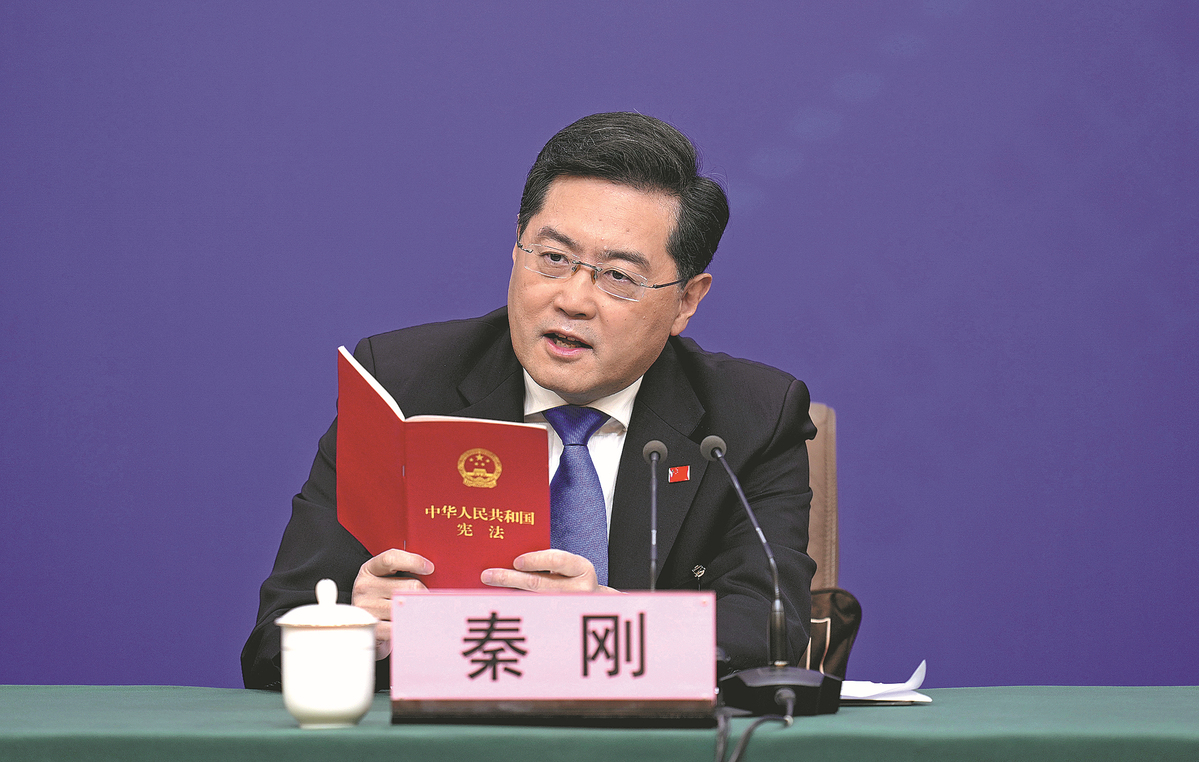'Strategic competition' seen as 'reckless gamble'


Foreign Minister Qin Gang said on Tuesday that the United States defining its relations with China as "strategic competition" is "a reckless gamble with the stakes being the fundamental interests of the two peoples and even the future of humanity", and the "competition" will get the two countries locked in a zero-sum game.
Speaking at a news conference in Beijing on the sidelines of the ongoing first session of the 14th National People's Congress, China's top legislature, Qin said this so-called competition aims to contain and suppress China in all respects, and "that is not fair competition but malicious confrontation".
He urged the US government to get rid of its strategic anxiety of "threat inflation", abandon the zero-sum Cold War mentality, refuse to be hijacked by "political correctness", honor its commitments and work with China to explore the right way to get along with each other.
"If the United States does not hit the brake but continues to speed down the wrong path, no amount of guardrails can prevent derailing and there will surely be conflict and confrontation," he said.
Qin's remarks came as China-US relationship is now mired in an abnormal climate and faces increasing challenges due to Washington's consistent attempts to suppress China in the economic and technological fields, and undermine the nation's sovereignty, security and development interests.
On March 1, the US House of Representatives' Foreign Affairs Committee voted to give US President Joe Biden the power to ban TikTok, a Chinese-owned short video platform. Recently, the US Department of Commerce has added new Chinese entities to its trade blacklist, including units of biotech company BGI and cloud computing company Inspur.
"If the US has the ambition to make itself great again, it should also have a broad mind for the development of other countries," Qin said, adding that containing and suppressing China will not make the US great and it will not stop the rejuvenation of China.
China-US relations should be determined by the common interests and shared responsibilities of the two countries and by friendship between the Chinese and American peoples, rather than by US domestic politics or hysterical neo-McCarthyism, he added.

At the news conference, Qin reiterated that the Taiwan question is at the very core of China's core interests, is the bedrock of the political foundation of China-US relations and the first red line that must not be crossed in China-US relations.
He urged Washington to stop containing China by exploiting the Taiwan question, return to the original meaning of the one-China principle, honor its political commitments to China and unequivocally oppose and forestall "Taiwan independence".
The US has constantly played the "Taiwan card" in recent years to challenge China's core interests by developing official exchanges with Taiwan and selling more advanced and sophisticated arms to the island.
Disregarding China's strong opposition, US politicians, including then US House speaker Nancy Pelosi, visited Taiwan last year. On March 1, the US State Department approved potential sales of new weapons worth $619 million to the island, a move that violates the three China-US joint communiques, especially the August 17 Communique.
Qin warned that the US' mishandling of the Taiwan question will shake the foundation of China-US relations. Resolving the Taiwan question is China's domestic affair, and no other country has the right to interfere in it, he added.
The foreign minister criticized the US' "Indo-Pacific strategy", saying that it seeks to gang up to form exclusive blocs. In fact, this "strategy" provokes confrontation, seeks to create an Asia-Pacific version of NATO and undermines regional integration, he said.
The US claim to "shape the strategic environment in which China operates" actually reveals that the real purpose of its "Indo-Pacific strategy" is to encircle China, he said. Such an attempt will only disrupt the ASEAN-centered, open and inclusive regional cooperation architecture and undermine the overall and long-term interests of regional countries, and it is bound to fail, he added.
Regarding the Ukraine crisis, Qin said it is a tragedy that could have been avoided. There seems to be "an invisible hand" pushing for the protraction and escalation of the conflict and using the crisis to serve a certain geopolitical agenda, he added.
Qin reiterated China's position on the Ukraine crisis, saying that China chooses peace over war, dialogue over sanctions and cooling down the situation over fueling the fire.
He said that China is not a party to the crisis and has not provided weapons to either side. The core of China's position on the Ukraine crisis is to facilitate peace talks, he said.
Noting that conflict, sanctions and pressure will not solve the problem, Qin called for calmness, reason and dialogue to resolve the crisis. "The process of peace talks should begin as soon as possible. And the legitimate security concerns of all parties should be respected. This is the right way to achieve durable security in Europe".
- China's CR450: A new era of high-speed rail at 400 km/h
- TAN SUO SAN HAO to pioneer future of deep-sea exploration
- Xi's discourses on Chinese modernization published in Japanese
- Officials summoned over alleged garbage bin food served to students
- Caring hearts help to enhance quality special education
- Xi sends condolences to South Korean acting president over plane crash






































